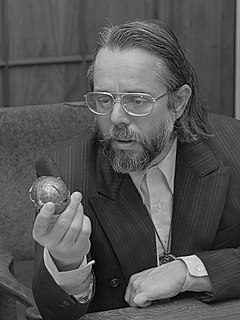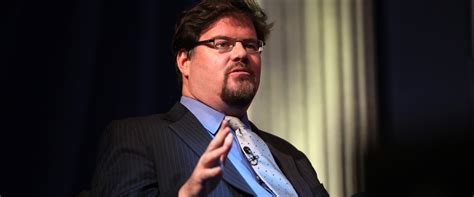A Quote by Leland Ryken
The secularization of Western culture was accompanied by the elevation of art to the position of a substitute religion to replace Christianity.
Quote Topics
Related Quotes
Art is not a substitute religion: it is a religion (in the true sense of the word: 'binding back', 'binding' to the unknowable, transcending reason, transcendent being). But the church is no longer adequate as a means of affording experience of the transcendental, and of making religion real - and so art has been transformed from a means into the sole provider of religion: which means religion itself.
It is often asserted that woman owes all the advantages of the position she occupies to-day to Christianity, but the facts of history show that the Christian Church has done nothing specifically for woman's elevation. In the general march of civilization, she has necessarily reaped the advantage of man's higher development, but we must not claim for Christianity all that has been achieved by science, discovery and invention.
Warhol and other Pop artists had brought the art religion of art for art's sake to an end. If art was only business, then rock expressed that transcendental, religious yearning for communal, nonmarket esthetic feeling that official art denied. For a time during the seventies, rock culture became the religion of the avant-garde art world.
The religion of art, like the religion of politics, was born from the ruins of Christianity. Art inherited from the old religion the power of consecrating things and endowing them with a sort of eternity; museums are our temples, and the objects displayed in them are beyond history. Politics--or more precisely, Revolution--co-opted the other function of religion: changing human beings and society. Art was an asceticism, a spiritual heroism; Revolution was the construction of a universal church.
If there is such a thing as being conditioned by climate and geography, and I think there is, it is the West that has conditioned me. It has the forms and lights and colors that I respond to in nature and in art. If there is a western speech, I speak it; if there is a western character or personality, I am some variant of it; if there is a western culture in the small-c , anthropological sense, I have not escaped it. It has to have shaped me. I may even have contributed to it in minor ways, for culture is a pyramid to which each of us brings a stone.
Christians have always tended to transform the Christian Revelation into a Christian religion. Christianity is said to be a religion like any other or, conversely, some Christians try to show that it is a better religion than the others. People attempt to take possession of God. Theology claims to explain everything, including the being of God. People tend to transform Christianity into a religion because the Christian faith obviously places people in an extremely uncomfortable position that of freedom guided only by love and all in the context of God's radical demand that we be holy.
Monotheism at Sinai, primitive Christianity, messianic socialism: these are the three supreme moments in which Western culture is presented with what Ibsen termed "the claims of the ideal." These are the three stages, profoundly interrelated, through which Western consciousness is forced to experience the blackmail of transcendence.
For a long time Christianity has sewn its teachings into the fabric of Western culture. That was a good thing …. But the season of sewing is ending. Now is a time for rending, not for the sake of disengaging from culture or retreating from the public square, but so that our salt does not lose its savor.
Where it is the majority religion, Islam does not recognize religious freedom, at least not as we understand it. Islam is a different culture. This doesn't mean that it's an inferior culture, but it is a culture that has yet to connect with the positive sides of our modern Western culture: religious freedom, human rights and equal rights for women.



































